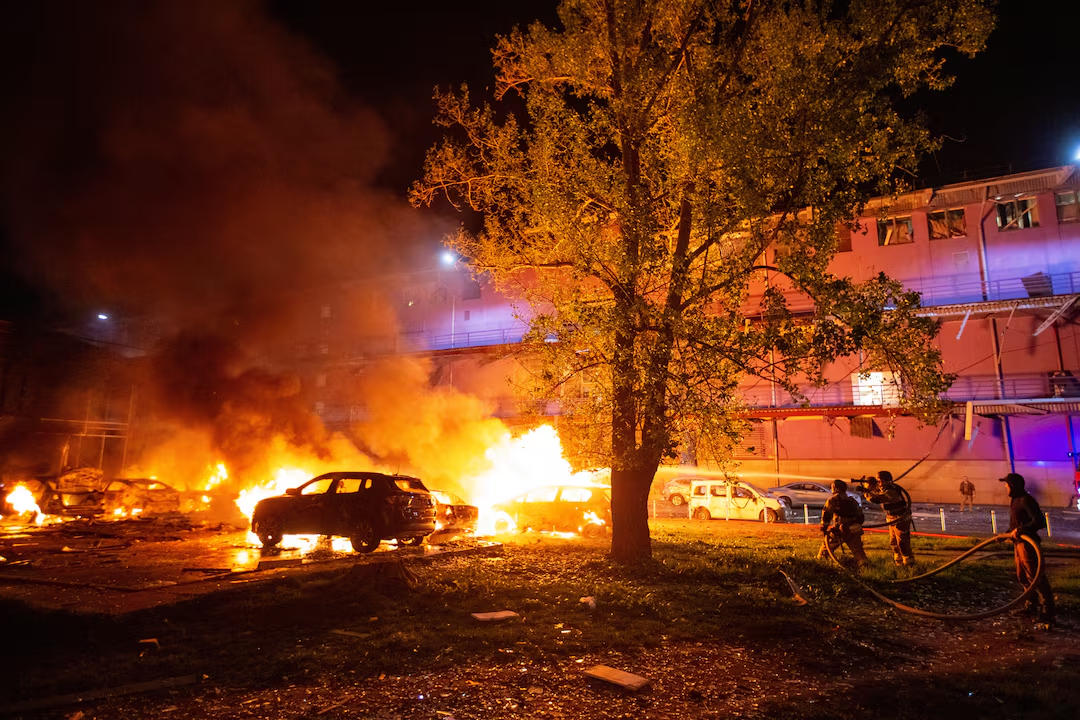WASHINGTON — United States intelligence officials believe Russian President Vladimir Putin’s threatened retaliation against Ukraine for last weekend’s devastating drone attack on Russian military installations has not yet materialized in full force, with expectations of a significant, multi-pronged counteroffensive in the coming days.

American officials told Reuters that Moscow’s complete response to Ukraine’s audacious assault on Russian warplanes remains forthcoming, likely involving coordinated strikes using various air capabilities including missiles and drones. The officials, speaking on condition of anonymity, indicated the timing of Russia’s comprehensive retaliation remains uncertain, though one source suggested it could occur within days.
The intelligence assessment suggests Russia’s anticipated response will be “asymmetrical,” meaning Moscow’s targeting approach and methodology will differ substantially from Ukraine’s weekend strike against Russian aircraft. Officials declined to specify expected Russian targets or elaborate on intelligence gathering methods underlying their analysis.
Russia launched an intensive missile and drone barrage against the Ukrainian capital Kyiv on Friday, with the Defense Ministry characterizing the assault as retaliation for what it termed Ukrainian “terrorist acts” against Russian territory. However, US officials maintain that Friday’s strikes represent only the beginning of Moscow’s broader retaliatory campaign.
Western diplomatic sources corroborate American intelligence assessments, suggesting Russia’s response may escalate significantly with strikes targeting symbolic Ukrainian installations including government buildings. The attacks would serve as Moscow’s clear message to Kyiv about the consequences of cross-border operations against Russian military assets.
A senior Western diplomat anticipated a devastating assault from Moscow, describing the expected Russian response as potentially “huge, vicious and unrelenting.” The diplomat acknowledged Ukrainian resilience while emphasizing the severity of anticipated Russian retaliation.
Michael Kofman, a Russia expert at the Carnegie Endowment for International Peace, suggested Moscow might specifically target Ukraine’s domestic security agency, the SBU, for its role in orchestrating last weekend’s cross-border operation. Russia could employ intermediate-range ballistic missiles to send a decisive message, potentially targeting SBU headquarters or regional intelligence administration facilities.
Kofman also identified Ukrainian defense manufacturing centers as potential targets for Russian retaliation, though he noted Moscow’s options may be constrained by its existing military commitments. Russia’s ability to substantially escalate beyond current strike patterns remains limited given the extensive resources already deployed against Ukraine.
Ukraine’s weekend operation, code-named “Spider’s Web,” involved 117 unmanned aerial vehicles launched from deep within Russian territory in a meticulously planned assault prepared over 18 months. Ukrainian forces smuggled drones close to Russian airbases using trucks before executing the coordinated attack against military installations.
American intelligence assessments indicate up to 20 Russian warplanes sustained damage during the operation, with approximately 10 aircraft destroyed. This figure represents roughly half the number estimated by Ukrainian President Volodymyr Zelenskiy, though it still constitutes a significant blow to Russian air capabilities.
The Russian government denied Thursday that any aircraft were destroyed, claiming all damage would be repaired. However, Russian military bloggers have reported losses or serious damage to approximately a dozen planes, including aircraft capable of carrying nuclear weapons.
The successful Ukrainian strike delivered a powerful symbolic blow to Russia, which has consistently emphasized its nuclear capabilities throughout the conflict. The attack demonstrated Ukraine’s growing operational sophistication and ability to conduct complex cross-border operations against heavily defended military targets.
President Putin informed President Donald Trump during a Wednesday telephone conversation that Moscow would respond to the Ukrainian attack, according to Trump’s social media post. Trump subsequently told reporters the Russian response would likely be severe, revealing his attempt to discourage Putin from escalating the conflict.
Trump characterized his conversation with Putin as an effort to prevent further escalation, though he acknowledged the deep animosity driving the conflict. The president’s comments reflected ongoing American concerns about potential Russian retaliation and its implications for regional stability.
The anticipated Russian response occurs against the backdrop of an evolving conflict that has seen both sides demonstrate increasing military sophistication and willingness to conduct operations beyond traditional battlefield boundaries. The cycle of attack and retaliation continues to shape the strategic dynamics of the prolonged conflict.



